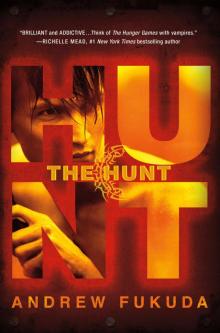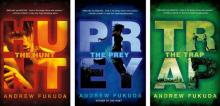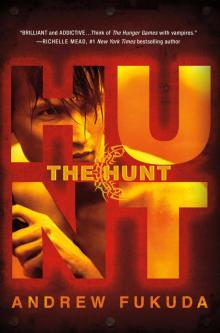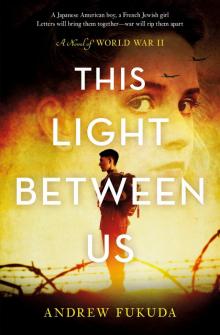- Home
- Andrew Fukuda
The Hunt Page 3
The Hunt Read online
Page 3
Re: YOUR HEPER HUNT LOTTERY NUMBERS
And these are my numbers: 3 16 72 87.
I couldn’t care less.
Everyone shoots off their numbers to one another. Within a minute, we realize that the first number in the sequence ranges from only 1 to 9; the remaining three numbers in the sequence range from 0 to 99. A meaningless tally over the first number is drawn up on the blackboard:
Irrational theories are quickly developed. For whatever reason, 4 – being the most common number in our classroom – is surmised as having the best chance of being the first number selected. And 3, with only one hit – me – is quickly dismissed as having no chance.
All fine with me.
It’s dark when I arrive home, a hint of grey smearing the sky. In another hour, the morning sun will peek over the distant mountains to the east. A siren will sound; anyone outside will have only five minutes to find shelter before the sun’s rays turn lethal. But it’s rare for anyone to be outside by that point. Fear of the sun ensures that by the time the sirens sound, the streets are empty and windows shuttered.
As I slip my key into the keyhole, I suddenly sense something is off. A fragrance? I can’t put my finger on it. I scan the driveway and streets. Other than a few horse-drawn carriages hurrying home, no one’s around. I sniff the air, wondering if I imagined it.
Somebody was just here. A few moments before I arrived.
I live alone. I have never invited anyone here. Other than me, nobody has even stood at the front door before. Until today.
Cautiously, I make my way around the perimeter of the house, looking for signs of disturbance. Everything looks fine. The stockpile of cash left by my father and secreted in the floor boards, though slowly diminishing, is untouched.
Closing the front door, I stand listening in the darkness of my home. No one else in here. Whoever was standing outside never came in. Only then do I light the candles. Colours break out.
This is my favourite time of day. When I feel like a prisoner taking his first steps of freedom or a diver rising from the depths of the mythical sea, drawing in his first gasps of air. This is the moment, after the endless grey-black hours of night, I see colour again. Under the flickering light of the candle, colours burst into being, flooding the room with pools of melted rainbows.
I put dinner in the microwave. I have to cook it twenty times, because the timer only goes up to fifteen seconds. Hot, slightly charred, is my preference, not the tepid, soppy mess I’m forced to eat outside. I remove my fangs, place them in my pocket. Then I bite into the burger, relishing the heat as it attacks my teeth, savouring the solid feel of charred crispiness. I close my eyes in enjoyment.
And feel dirty, ashamed.
After my shower – showering is this thing you do where you rub gobs of hand sanitiser and pour water over your body to get rid of odour – I lie on the sofa, my head propped up on folded sweatshirts. Only one candle is alight; it casts flickering shadows on the ceiling. Sleep-holds dangle above me, placed there years ago merely for show on the off chance a visitor might drop by. The radio is on, the volume set low. “Many experts are speculating that the number of hepers will be in the range of three to five,” the radio analyst says. “But because the Director was silent on this issue, there really is no way of knowing.”
The radio programme continues, with a few callers chiming in, including a crotchety woman who speculates that the whole thing is rigged: the “winner” will end up being someone with deep pockets and close friends in high places. Her call is suddenly cut off. Other callers weigh in about the number of hepers in the Hunt this time. Only one thing is for certain: it has to be at least two, because the Director – in a voice loop that has been played over and over – used the plural tense: hepers.
I listen to a few more callers, then get up and switch off the radio. In the quiet that follows, I hear the gentle pit-pat of rain on the shutters.
My father sometimes took me out in the daytime. Except for the times he took me swimming, I hated going outside. Even with sunglasses, the brightness was overwhelming. The burning sun was like an unblinking eye, spilling light like acid out of a beaker, turning the city into an endless flash. Nothing moved out there.
He would take me to empty sports stadiums and vacant shopping malls. Nothing was locked, because sunlight provided the best security. We’d have the whole Core Park to fly kites or the empty public pool to swim in. He told me this ability to withstand sun rays was a strength, made us superpowerful. We can withstand what kills them. But to me, it was only something that made us different, not stronger. I wanted to be like everyone else, cocooned in the dome of darkness that was home. Blackness comforted me. It hurt my father to hear that, but he didn’t say anything. Gradually, we stopped going out.
Except when a certain awful need hit us.
Like right now. I open the door. The rain has stopped.
I venture out.
The city is fast asleep behind shuttered husks of darkness. I “borrow” a horse from a neighbouring yard and ride down empty streets under an overcast sky.
I head out today because every few weeks I get the urge. When my father was alive, we’d venture out together. The shame was mutual because we’d never speak, wouldn’t even look each other in the eye. We went far, past the city borders, to the Vast Lands of Uncertain End. That’s a mouthful, and most people simply call it the Vast. It’s an endless stretch of desert plains. Nobody knows how far it goes or what lies beyond it.
Because I live in the outer suburbs, far from the tall office buildings of the Financial District and farther yet from the centre of the metropolis where towering governmental skyscrapers clutter the landscape, it doesn’t take long before the city is well behind me. The city boundary is vague: there’s no wall to demarcate the beginning of the Vast. It arrives indiscernibly. Scattered homes give way to dilapidated poultry farms, which in turn cede to crumbling shacks long ago abandoned. Eventually, it’s just the spread of empty land. The Vast. There’s nothing out there. No place to flee. Only the cruellest of elements, the three Ds: desert, desolation, and death. There’s no escape for us out here, my father would say, no sanctuary, no hope, no life for us at all. Don’t ever come out here thinking there’s escape to be had.
I don’t dilly-dally out here but head north. About an hour out, an isolated mound of soft green fuzz sits there in the middle of the Vast, an aberrational oddity discovered years ago by my parents. And what I need is in the green fuzz. By the time my feet hit the soft grass, I’m sprinting towards a glade of trees. I reach for a red fruit hanging off a branch. I tear it off, shut my eyes, and sink my teeth through the skin. The fruit crunches in my mouth, watery and sweet, my jaws working up and down, up and down. When my father and I ate the fruit, we’d eat with our backs to each other. We were ashamed, even as we chewed, bite after bite, juice running down our chins, unable to stop.
After my fourth fruit, I force myself to slow down. I pluck away at the different offerings of fruit, tossing them into a bag. I pause for a minute, gazing up at the sky. High above me, a large bird glides across the sky, its wings oddly rectangular. It circles around me, its form strangely unchanging, then heads east, disappearing into the distance. I pick a few more fruit, then head over to our favourite spot, a large tree whose leaves spread lush and high. My father and I always sat under this tree, munching fruit, back against the trunk, the city in the far distance, darkened and flat. Like a dirty puddle.
Years ago, we would explore the green fuzz for signs of others like us. Signs like rutted cores of discarded fruit, trampled grass, snapped branches. But we almost never found anything. Our kind was careful not to leave any giveaway signs. Even so, I’d occasionally find that unavoidable and clearest of signs: less fruit on trees. That meant others had been there as well, plucking and eating. But I never saw any of them.
Once, between bites, I asked my father, “Why don’t we ever see other hepers here?”
He stopped chewing, half turned his
head towards me. “Don’t use that word.”
“What word? Heper? What’s wrong with—”
“Don’t use that word,” he said sternly. “I don’t want to hear that word coming out of you ever again.”
I was young; tears rushed to my eyes. He turned fully towards me, his large eyes swallowing me whole. I tilted my head back to keep the tears from rimming out. Only after my tears dried did he turn his eyes away. He gazed afar at the horizon until the rocks stopped churning inside him.
“Human,” he finally said, his voice softer. “When we’re alone, use that word, OK?”
“OK,” I said. And after a moment, I asked him, “Why don’t we see other humans?”
He didn’t answer. But I can still remember the sound as he bit off large chunks of apple, loud crunches exploding in his mouth as we sat under a tree drooping with ripe fruit.
And now, years later, there’s even more fruit hanging off the trees, an overabundance of colour in the verdant green fuzz. So sad, to have colours signify death and extinction. And that’s how I eat now, alone in the green fuzz, a solitary grey dot among splashes of red and orange and yellow and purple.
Dusk arrives, the night of the lottery. Inside every home, young and old are awake, jittery with excitement. When the night horn sounds, shutters and grates rise, doors and windows fling open. Everyone is early to work and school tonight, to chit-chat and tap impatiently on computer screens before them.
At school, there’s not even an attempt at normality. In second period, the teacher doesn’t call the class to order but simply disregards us as she taps away on her deskscreen. Halfway through class, a citywide announcement on the intercom is made: because work productivity in the city has fallen so drastically, the announcement of the lottery numbers has been moved up a few hours. In fact, it will now be broadcast live in a few minutes. “Have your numbers in front of you,” the announcer ends cheerily, as if everyone hasn’t already memorised them.
Instantly, delirium breaks out in the classroom. Students rush back to their seats, eyes fastened on deskscreens.
“Are you ready for the lottery yet?” the news anchor says a few minutes later, all aplomb abandoned in his excitement. “I have mine right here,” he says, holding up a sheet of paper with his numbers. “Tonight might just be my night, I woke up with a feeling in me.”
“As did every citizen of this great city, no doubt,” chimes in his co-host, a slim woman with jet black hair. “We’re all so excited. Let’s go now to the Heper Institute, where the numbers are about to be picked.” She pauses, her finger reaching up to her earpiece. A feral glint invades her eyes. “We’re getting word now of a surprise. This is a whopper, folks, so sit down.”
In the classroom, heads snap back and then lurch forward. No one says a word.
“Instead of having the Director pick the numbers, the Palace has decided a captive heper will pick the numbers.”
Somebody snorts loudly; several students suddenly leap onto their desks.
“You heard that right, folks,” she continues, and her voice is wetter now, with a slight lisp. “We’re getting a live feed . . .” She pauses again. “I’m hearing that it’s coming from a secret location from within the Heper Institute. Take us there now.”
Instantly, the view of the newsroom switches to that of a bare, cavernous indoor arena. No windows or doors. Placed in the centre of the arena is an empty chair. Next to it, a large hemp sack and a glass bowl. But nobody is looking at the sack or the chair or the glass bowl. All our eyes are fastened on the blurry image of a male heper crouched in the corner.
It is elderly and wiry, but its stomach is fat-marbled and protrudes disproportionately to its thin frame. Hair plasters its arms and legs, and the sight of the hair sends a river of lip smacking through the classroom.
The videocamera zooms in and then out on the heper. But clearly the camera must be running unmanned, on autopilot. If anyone were in the arena with the heper, the heper would have been devoured within seconds. The newest wave of videocameras – weighing a relatively spry two tons – is capable of autozooming, a technological advancement unimaginable just a decade ago.
The camera zooms in now, capturing the heper’s uncertainty as it gazes upward at something offscreen. Then, as if instructed, it gets up and walks to the chair. There is indecision in its every step, caution. Emotions pour nakedly off its face.
A student shakes his head violently, drool trapezing outward, some of it landing on me. Saliva pours out of our mouths, collecting in small pools on desks and the floor. Heads are half cocked sideways and back, bodies tensed. Everyone in a trance and a heightened sense of alertness.
The news anchors have been silent.
The heper reaches the chair, sits down. Again, eyes bulging wide, it looks offscreen for direction. Then it reaches into the hemp sack and takes out a ball. A number is printed on it: 3. It holds the ball up to the camera for a second, then puts it in the glass bowl.
It takes a moment before we realize what’s just happened. The news anchors break their silence, their voices wet and blubbery with saliva. “We have the first number, folks, we have the first number. It’s three!” Loud groans all around, fists crumpling sheets of paper. The teacher in the back of the classroom whispers a cuss.
I stare down at my own paper: 3, 16, 72, 87. Coolly, I cross out the number 3. Only a few classmates are still in the running. It’s easy to spot them. Their eyes are sparkling with anticipation, drool running down their exposed fangs. Everyone else is unclenching now, muscles relaxing, mouths and chins being wiped. They slump in their chairs.
The heper nervously reaches for another number.
16.
More groans. I take my pen and cross out 16, a slight tremor in my fingers. Must hold the pen tighter, get my fingers under control.
As far as I can tell, that last number took out the remaining contenders in the class. Except me. Nobody has noticed yet that I’m still in the running. I kick out more saliva, let it run down my chin. I hiss a little, cock my head back. Heads flick towards me. Before long, a crowd has gathered around my desk.
The heper pulls out the next number.
72.
There is a momentary, stunned silence. Then heads start bopping, knuckles cracking. My next number – 87 – is chanted like a mantra. Somebody runs out, tells the adjacent classroom. I hear chairs scraping against the floor; moments later, they come flying in, crowding around me. Drool splatters on me from above; a few are hanging upside down from the ceiling, staring down at my screen. News flies up and down the hallways.
My heart, like a claustrophobic rat in a cage, is out of control. Fear grips me. But for the moment, no one is looking at me; everyone is fixated on the screen. Something is wrong with the heper. It’s shaking its head from side to side now, almost violently, eyes wide with fear. A naked, overwhelming display of emotion. A fruit suddenly falls from a small opening in the ceiling. A red fruit, and the heper leaps for it, devouring it within seconds.
“So disgusting,” somebody says.
“I know, I can barely watch.”
The heper takes a few steps towards the sack, is about to pull out the last number, when it pauses. It drops the sack and retreats to the far corner, where it crouches, hands over ears, eyes snapped shut. For a second, it lifts its head and stares offscreen. Then its eyes widen with fear, and its head shakes violently. It pins its head between its knees.
“It doesn’t want to pick the last number,” a student whispers.
“I told you,” my teacher says, “these hepers are smarter than they look. It somehow knows these numbers are for the Hunt.”
The screen blacks out. The next shot is of the newsroom. The anchors are caught off guard. “Looks like we’re having technical difficulties,” the male anchor says, quickly wiping his chin. “We should be back on air shortly.”
But it takes more than a few moments. Video of the heper picking the first three numbers is looped over and over. Word spreads ar
ound school about me; more students crowd the classroom. Then more news: another student in the school is still in the running. As I pump out more saliva down my chin and jerk my head in staccato fashion, I make some rough maths calculations in my head. The odds that I have the last winning number are 1 in 97. That’s just a little over 1 per cent. A comfortingly low chance, I tell myself.
“Look!” someone says, pointing at the deskscreen.
The TV channel has shifted away from the newsroom to an outdoor location. The male heper is gone. In its stead is a female heper, young. This heper is sitting outdoors in a chair, a hemp sack and glass bowl on the ground next to it. The image is glassy and shiny, as if a glass wall stands between the heper and camera. Behind the heper, distant mountains sit under the few stars that dot the night sky. Unlike the other heper, this female heper is looking not nervously offscreen, but directly at the camera. With a collectedness in its gaze, a self-possession that seems odd in a captive heper.
Some of the boys lurch up on desks. A female heper is known to be the choicer morsel of the two genders. The flesh meatier, fattier in parts. And a teenage one – as this one appears to be – is the most succulent of all, its taste beyond compare.
Before the hissing and drooling kicks up again, the heper is already reaching into the sack. It calmly removes a ball, holds it with outstretched arm towards the camera. But it’s the eyes I’m looking at: how focused they seem to be on mine, as if they see me in the camera lens.
I don’t need to see the ball to know the heper has picked number 87. An explosive hiss curdles out from classmates, followed by a phat-phat-phat of smacking lips. The congratulations begin: ears brought down to mine, rubbing up and down, side to side. A minute later, between ear hugs, I glance down at the deskscreen. Amazingly, the heper is still holding the numbered ball up to the camera, a look of quiet defiance imprinted on its face. The picture starts to fade out. But in the moment before it does, I see the heper’s eyes moistening, its head slanting forward ever so, hair bangs falling over its eyes. Its defiance seems to melt into a sudden, overcoming sadness.

 The Hunt
The Hunt The Trap
The Trap The Prey
The Prey This Light Between Us
This Light Between Us